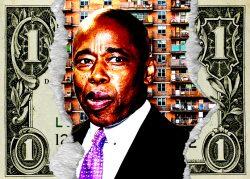New Jersey’s attorney general is stepping up enforcement of source-of-income discrimination against tenants, though the penalties announced are far from crippling.
The AG’s office announced enforcement action in eight separate cases. Its Division on Civil Rights found probable cause in six instances and reached consent decrees in two other cases. But only two payments were required and the amounts were not disclosed. The AG also spared the landlords a public shaming by not revealing their names.
Still, Attorney General Matthew Platkin claimed in a release that the enforcement actions put “all landlords on notice that housing discrimination of any kind will not be tolerated.”
All eight cases involved allegations that individuals were denied the opportunity to rent housing because they were receiving public assistance. Landlords in New Jersey are prohibited from refusing or discouraging renters because they get rental aid, which typically comes in the form of vouchers.
In four of the cases, landlords allegedly refused to rent to applicants after it became clear they planned on using Section 8 or other rental assistance to pay the bills. One complainant alleged a Craigslist ad spelled out the discrimination in uppercase letters: “NO SECTION 8.”
In one Union County case, a landlord allegedly denied a lease renewal after failing to provide documentation sought by the tenant to apply to the state’s rental assistance program.
The six probable cause cases indicate the civil rights unit finished a preliminary investigation and found likely violations of the law. They are not considered final rulings.
The two consent decrees signal that the parties settled the cases. They require the housing providers to come into compliance with the discrimination law, receive discrimination training and make payments to both the civil rights division and the individual who made the allegation.
The providers in those cases don’t have to admit to violating the law. The Real Deal has reached out to the AG’s office to learn more details about any penalties.
Voucher discrimination is one of the most common forms of discrimination against tenants, sometimes serving as a proxy for racial or disability discrimination; tenants who use vouchers are disproportionately people of color or with disabilities.
In New York City, a sweeping broker discrimination lawsuit, also involving Section 8 vouchers, was recently greenlighted by a federal judge.
Read more



